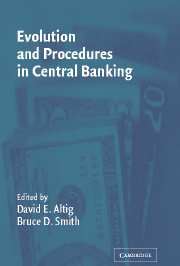Book contents
- Frontmatter
- Contents
- List of Contributors
- Acknowledgments
- In Memoriam
- Introduction
- PART I OPERATIONAL ISSUES IN MODERN CENTRAL BANKING
- PART II MONETARY UNION
- PART III PRIVATE ALTERNATIVES TO CENTRAL BANKS
- 5 Banking Panics and the Origin of Central Banking
- Commentary
- 6 Establishing a Monetary Union in the United States
- Commentary
- 7 Currency Competition in the Digital Age
- Commentary
- Index
7 - Currency Competition in the Digital Age
Published online by Cambridge University Press: 31 July 2009
- Frontmatter
- Contents
- List of Contributors
- Acknowledgments
- In Memoriam
- Introduction
- PART I OPERATIONAL ISSUES IN MODERN CENTRAL BANKING
- PART II MONETARY UNION
- PART III PRIVATE ALTERNATIVES TO CENTRAL BANKS
- 5 Banking Panics and the Origin of Central Banking
- Commentary
- 6 Establishing a Monetary Union in the United States
- Commentary
- 7 Currency Competition in the Digital Age
- Commentary
- Index
Summary
INTRODUCTION
A striking macroeconomic fact is the dramatic recent decline in worldwide inflation. What accounts for this newfound discipline by central banks around the globe? I argue that an important but largely overlooked factor is technological innovation in transactions and payments services. Such innovations have significantly reduced the costs of using alternative means of payment when the local currency is rapidly depreciating in value. A quarter-century ago, Hayek (1978) argued that breaking a central bank's monopoly of issue is necessary to protect against the inflationary excesses to which government central banks have succumbed throughout history. To achieve this end, Hayek proposed the abolition of legal tender laws and the elimination of government controls on monetary movements around the globe. I argue that advances in transactions and payments technology have eroded the local monopoly of issue and have resulted in greater discipline on central bank behavior. In addition, these advances have enhanced the feasibility of private-sector provision of monetary services.
I first document the trends in worldwide inflation during the last 40 years. I then discuss alternative explanations for the recent reduction, including the rise of central bank independence, the role of fixed exchange rates as discipline devices, and various political and fiscal factors. I also explain the role of technology in more detail. This will form the basis of a more speculative discussion of what the evolution of these transactions technologies implies for the feasibility of private provision of monetary services and the forms that such competition to central bank issue would likely take.
- Type
- Chapter
- Information
- Evolution and Procedures in Central Banking , pp. 275 - 296Publisher: Cambridge University PressPrint publication year: 2003
- 2
- Cited by

